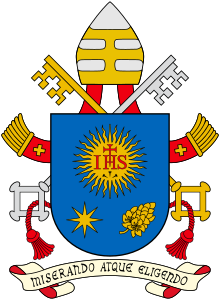Misericordia et misera
Misericordia et misera ("Mercy and the wretched") is an apostolic letter from Pope Francis named after his incipit . It was published on November 20, 2016, at the end of the extraordinary Holy Year of Mercy .
Form of writing
Writing in the form of an exhortation consists of twenty-two short chapters. The opening words Misericordia et misera come from a commentary by St. Augustine on the meeting of Jesus with the adulteress who was to be stoned ( Jn 8 : 1-11 EU ). Augustine: "Two remained, the merciful and the merciful".
content
In an introduction, the Pope explains the naming of the letter and relates the passage from the Gospel of John to the past year of mercy in the Catholic Church. The second chapter describes forgiveness as the most visible sign of the Father's love in the life of Jesus Christ. Up to the point of death on the cross, there is no passage in the Gospel “that can be excluded from this imperative of love, which extends to forgiveness”.
Starting from the pericope about the encounter of the sinner who anointed Jesus' feet, Francis speaks below about joy, and then comes back to the holy year of mercy, for which thanks should be given. This is followed by a detailed outlook based on the experience of mercy in the administration of the sacraments . Last but not least, the church wanted to expressly refer to mercy when designating the sacraments of reconciliation and the anointing of the sick as "sacraments of healing" and in their donation formulas.
What follows is the importance of going to church on Sundays for the individual and the homily . In connection with this, it is important to the Pope that a Sunday of the church year should be dedicated to the Word of God in every community, "in order to understand the inexhaustible riches that arise from this constant dialogue between God and his people."
After revisiting the relationship between the sacrament of penance and mercy, the Pope exhorts the priests to be open, receptive, caring, available, farsighted and generous in forgiveness, but at the same time to be clear about the exposition of moral principles. The sacrament of reconciliation must find its central place in Christian life again, and the priests specifically put their lives in the “service of reconciliation”. So that “nothing stands in the way of the desire for reconciliation and God's forgiveness”, the Pope below grants all priests the “authority to absolve those who undertook it and repentedly ask for forgiveness from the sin of abortion”. This permission had previously been granted with the bull Misericordiae vultus for the duration of the holy year. Misericordia et misera lifts the time limit and declares the permit still valid (No. 12).
In this context, the Pope also for the time being lifts the time limit on the permission for the faithful to receive the sacrament of penance from priests of the Brotherhood of St. Pius , “so may the sacramental sign of reconciliation through the forgiveness of the Church never be missing.” This permission too was previously granted for the duration of the holy year.
With remarks on the value of consolation, silence and the family, Francis turns to the sacrament of marriage and finally to the moment of death. The latter means a great challenge for the church against the background of a culture that often tends to trivialize death to the point where it "becomes pure fiction" or suppresses it. On the other hand, death is a “painful and inevitable transition”, which is nevertheless full of meaning and which must be prepared. "We experience the exequies as a hopeful prayer for the soul of the deceased and as a gift of consolation for those who suffer from the farewell of a loved one."
Point 16 contains explanations about the importance and value of the bodily works of mercy that restore human dignity. The Pope links this to the main work of mercy to clothe the naked, which he relates to the fall of man and the expulsion from paradise. The shame about God's punishment will be overcome and their dignity will be restored by his action to make them skirts out of furs ( Gen 3:21 EU ). The social character of mercy demands “not to remain inactive and to drive away indifference and hypocrisy, so that plans and projects do not remain a dead letter.” It is important to let a “culture of mercy” grow that is expressed in “persistent prayer , in the willing openness to the work of the Holy Spirit, in familiarity with the life of the saints and in concrete closeness to the poor ”.
In the following the Pope explains his wish to celebrate the last Sunday of the year in the whole Church as World Day of the Poor. This wish arose in connection with the celebration of a “Jubilee of Mercy for those excluded from society” and, in the eyes of the Pope, the most worthy preparation for the celebration of the feast of Christ the King with its eschatological character, “because Jesus Christ dealt with the lowly and identified with the poor and will judge us according to the works of mercy ”(n. 21).
Web links
- Apostolic Exhortation Misericordia et misera on the Holy See website
- Catholic Church: Pope Facilitates Forgiveness of Abortion , Zeit Online, November 21, 2016
Individual evidence
- ↑ Augustine (354-430), Lectures on the Gospel of John, ( Tractatus in Iohannis Evangelium , Lecture 33, Chapter 5) [1]
- ↑ Pope Allows Priests to Forgive Abortion , Die Zeit, September 1, 2015.
